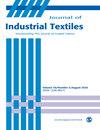Utilization of deep learning to classify resistance training exercises by the fabricated resistive stretch sensor
IF 2
4区 工程技术
Q1 MATERIALS SCIENCE, TEXTILES
引用次数: 0
Abstract
In this study, the authors proposed a method to fabricate a resistive stretch textile sensor from polyester spandex (PET/SP) fabric and commercial single-walled carbon nanotube (SWCNT). In addition, we designed and trained a one-dimension convolutional neural network to classify four resistance workouts, which employed data acquired from the proposed sensor as the input. To figure out the most appropriate PET/SP sample for the deep learning application, we investigated morphologies and characterization of three samples in distinct conditions of the coating process. Data acquired from the proposed sensor illustrated the significant difference between activated and non-activated muscle groups in each specific exercise. With the PET/SP sample which met the requirements of the application, after 100 epochs, the deep learning model achieved 97.2% training accuracy and 90% test accuracy. This study demonstrates that the SWCNT-coated PET/SP stretch textile sensor can be utilized effectively to track the activity of forearm muscles during resistance training. Other than that, the proposed 1D-CNN, with the advantage of training time and computational cost, is able to classify time series data with high performance and thus can be applied widely in various deep learning applications, especially in the healthcare and sports industries.利用深度学习对自制的电阻式拉伸传感器进行阻力训练分类
在本研究中,作者提出了一种由聚酯-氨纶(PET/SP)织物和商用单壁碳纳米管(SWCNT)制备电阻拉伸纺织品传感器的方法。此外,我们设计并训练了一个一维卷积神经网络来对四种阻力训练进行分类,该网络使用从所提出的传感器获取的数据作为输入。为了找出最适合深度学习应用的PET/SP样品,我们研究了三种样品在不同涂层工艺条件下的形貌和表征。从所提出的传感器获得的数据表明,在每次特定运动中,激活的和非激活的肌群之间存在显著差异。使用符合应用要求的PET/SP样本,经过100个历元后,深度学习模型的训练准确率达到97.2%,测试准确率达到90%。这项研究表明,SWCNT涂层的PET/SP拉伸织物传感器可以有效地用于跟踪阻力训练中前臂肌肉的活动。除此之外,所提出的1D-CNN具有训练时间和计算成本的优势,能够对时间序列数据进行高性能分类,因此可以广泛应用于各种深度学习应用,特别是在医疗保健和体育行业。
本文章由计算机程序翻译,如有差异,请以英文原文为准。
求助全文
约1分钟内获得全文
求助全文
来源期刊

Journal of Industrial Textiles
MATERIALS SCIENCE, TEXTILES-
CiteScore
5.30
自引率
18.80%
发文量
165
审稿时长
2.3 months
期刊介绍:
The Journal of Industrial Textiles is the only peer reviewed journal devoted exclusively to technology, processing, methodology, modelling and applications in technical textiles, nonwovens, coated and laminated fabrics, textile composites and nanofibers.
 求助内容:
求助内容: 应助结果提醒方式:
应助结果提醒方式:


